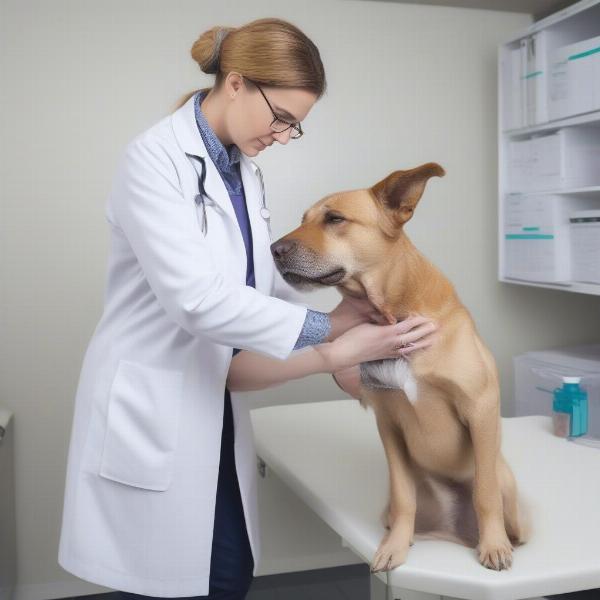Liver disease in dogs can be a serious concern, and many pet owners seek liver protectors to support their furry friend’s health. Understanding the role of liver protectors, when they’re necessary, and how to choose the right one is crucial for ensuring your dog’s well-being. This guide will provide you with all the essential information you need to know about liver protectors for dogs.
What are Liver Protectors for Dogs?
Liver protectors, also known as hepatoprotectants, are supplements designed to support liver function and protect against damage. They can contain various ingredients, including vitamins, minerals, herbs, and antioxidants. These ingredients work together to help detoxify the liver, reduce inflammation, and promote cell regeneration.
When are Liver Protectors Recommended?
While a healthy diet is the cornerstone of liver health, liver protectors can be beneficial in certain situations. Your veterinarian might recommend a liver protector if your dog has been diagnosed with a liver condition, is taking medications known to affect the liver, or has been exposed to toxins. They can also be used as a preventative measure for dogs at risk of developing liver problems.
Choosing the Right Liver Protector
Selecting the right liver protector can be overwhelming with the numerous options available. Look for products containing SAMe (S-adenosylmethionine), milk thistle, N-acetylcysteine (NAC), and antioxidants like Vitamin E and C. Always consult your veterinarian before starting your dog on any new supplement, including liver protectors. They can help you choose a product that’s safe and effective for your dog’s specific needs.
 Veterinarian Examining a Dog
Veterinarian Examining a Dog
Key Ingredients in Liver Protectors
SAMe (S-adenosylmethionine)
SAMe is a naturally occurring compound involved in various cellular processes. It plays a critical role in liver detoxification and can help regenerate liver cells.
Milk Thistle
Milk thistle, a well-known herb, contains silymarin, which has antioxidant and anti-inflammatory properties. It can protect liver cells from damage and promote regeneration.
N-acetylcysteine (NAC)
NAC is a precursor to glutathione, a powerful antioxidant that helps protect the liver from damage caused by free radicals.
Antioxidants
Antioxidants, such as Vitamins E and C, help neutralize free radicals, which can contribute to liver damage.
Signs of Liver Problems in Dogs
It’s important to be aware of the signs of liver problems in your dog. These can include jaundice (yellowing of the skin and gums), vomiting, diarrhea, loss of appetite, lethargy, increased thirst, and changes in urine color or frequency. If you notice any of these signs, contact your veterinarian immediately.
Conclusion
Liver protectors can be a valuable tool in supporting your dog’s liver health. However, they should be used under the guidance of a veterinarian. By understanding the function of liver protectors and choosing the right product, you can help ensure your dog’s liver remains healthy and functioning optimally. Always prioritize a balanced diet and regular veterinary checkups for overall well-being.
FAQ
- What is the best liver protector for dogs? The best liver protector for your dog depends on their individual needs and underlying health conditions. Consult your veterinarian for recommendations.
- Can I give my dog human liver supplements? No, do not give your dog human liver supplements. Always use products specifically formulated for dogs.
- How long should my dog take a liver protector? The duration of treatment with a liver protector varies depending on the specific condition and your veterinarian’s recommendations.
- Are there any side effects of liver protectors for dogs? Some dogs may experience mild side effects like gastrointestinal upset. Consult your vet if you notice any adverse reactions.
- Can liver protectors cure liver disease? Liver protectors are not a cure for liver disease, but they can support liver function and help manage symptoms.
- How can I prevent liver problems in my dog? A balanced diet, regular exercise, and avoiding exposure to toxins are crucial for preventing liver problems.
- What are the signs of liver failure in dogs? Signs of liver failure can include jaundice, vomiting, diarrhea, seizures, and neurological symptoms. Seek immediate veterinary care if you observe these signs.
ILM Dog is a leading international online resource dedicated to providing dog owners with reliable, practical information on all aspects of dog care. We offer expert advice on everything from breed selection and health care to training, nutrition, and grooming. Whether you’re a new dog owner or a seasoned expert, ILM Dog is your go-to source for comprehensive dog care information. For personalized advice and support, contact us at [email protected] or call us at +44 20-3965-8624. Visit ILM Dog for more information.